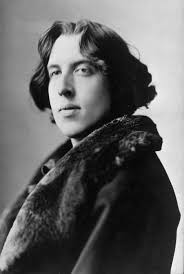The Picture of Dorian Gray Page #12
The Picture of Dorian Gray is a Gothic and philosophical novel by Oscar Wilde, first published complete in the July 1890 issue of Lippincott's Monthly Magazine. Fearing the story was indecent, prior to publication the magazine's editor deleted roughly five hundred words without Wilde's knowledge.
"I want him to play to me," cried Lord Henry, smiling, and he looked down the table and caught a bright answering glance. "But they are so unhappy in Whitechapel," continued Lady Agatha. "I can sympathize with everything except suffering," said Lord Henry, shrugging his shoulders. "I cannot sympathize with that. It is too ugly, too horrible, too distressing. There is something terribly morbid in the modern sympathy with pain. One should sympathize with the colour, the beauty, the joy of life. The less said about life's sores, the better." "Still, the East End is a very important problem," remarked Sir Thomas with a grave shake of the head. "Quite so," answered the young lord. "It is the problem of slavery, and we try to solve it by amusing the slaves." The politician looked at him keenly. "What change do you propose, then?" he asked. Lord Henry laughed. "I don't desire to change anything in England except the weather," he answered. "I am quite content with philosophic contemplation. But, as the nineteenth century has gone bankrupt through an over-expenditure of sympathy, I would suggest that we should appeal to science to put us straight. The advantage of the emotions is that they lead us astray, and the advantage of science is that it is not emotional." "But we have such grave responsibilities," ventured Mrs. Vandeleur timidly. "Terribly grave," echoed Lady Agatha. Lord Henry looked over at Mr. Erskine. "Humanity takes itself too seriously. It is the world's original sin. If the caveman had known how to laugh, history would have been different." "You are really very comforting," warbled the duchess. "I have always felt rather guilty when I came to see your dear aunt, for I take no interest at all in the East End. For the future I shall be able to look her in the face without a blush." "A blush is very becoming, Duchess," remarked Lord Henry. "Only when one is young," she answered. "When an old woman like myself blushes, it is a very bad sign. Ah! Lord Henry, I wish you would tell me how to become young again." He thought for a moment. "Can you remember any great error that you committed in your early days, Duchess?" he asked, looking at her across the table. "A great many, I fear," she cried. "Then commit them over again," he said gravely. "To get back one's youth, one has merely to repeat one's follies." "A delightful theory!" she exclaimed. "I must put it into practice." "A dangerous theory!" came from Sir Thomas's tight lips. Lady Agatha shook her head, but could not help being amused. Mr. Erskine listened. "Yes," he continued, "that is one of the great secrets of life. Nowadays most people die of a sort of creeping common sense, and discover when it is too late that the only things one never regrets are one's mistakes." A laugh ran round the table. He played with the idea and grew wilful; tossed it into the air and transformed it; let it escape and recaptured it; made it iridescent with fancy and winged it with paradox. The praise of folly, as he went on, soared into a philosophy, and philosophy herself became young, and catching the mad music of pleasure, wearing, one might fancy, her wine-stained robe and wreath of ivy, danced like a Bacchante over the hills of life, and mocked the slow Silenus for being sober. Facts fled before her like frightened forest things. Her white feet trod the huge press at which wise Omar sits, till the seething grape-juice rose round her bare limbs in waves of purple bubbles, or crawled in red foam over the vat's black, dripping, sloping sides. It was an extraordinary improvisation. He felt that the eyes of Dorian Gray were fixed on him, and the consciousness that amongst his audience there was one whose temperament he wished to fascinate seemed to give his wit keenness and to lend colour to his imagination. He was brilliant, fantastic, irresponsible. He charmed his listeners out of themselves, and they followed his pipe, laughing. Dorian Gray never took his gaze off him, but sat like one under a spell, smiles chasing each other over his lips and wonder growing grave in his darkening eyes. At last, liveried in the costume of the age, reality entered the room in the shape of a servant to tell the duchess that her carriage was waiting. She wrung her hands in mock despair. "How annoying!" she cried. "I must go. I have to call for my husband at the club, to take him to some absurd meeting at Willis's Rooms, where he is going to be in the chair. If I am late he is sure to be furious, and I couldn't have a scene in this bonnet. It is far too fragile. A harsh word would ruin it. No, I must go, dear Agatha. Good-bye, Lord Henry, you are quite delightful and dreadfully demoralizing. I am sure I don't know what to say about your views. You must come and dine with us some night. Tuesday? Are you disengaged Tuesday?" "For you I would throw over anybody, Duchess," said Lord Henry with a bow. "Ah! that is very nice, and very wrong of you," she cried; "so mind you come"; and she swept out of the room, followed by Lady Agatha and the other ladies. When Lord Henry had sat down again, Mr. Erskine moved round, and taking a chair close to him, placed his hand upon his arm. "You talk books away," he said; "why don't you write one?" "I am too fond of reading books to care to write them, Mr. Erskine. I should like to write a novel certainly, a novel that would be as lovely as a Persian carpet and as unreal. But there is no literary public in England for anything except newspapers, primers, and encyclopaedias. Of all people in the world the English have the least sense of the beauty of literature." "I fear you are right," answered Mr. Erskine. "I myself used to have literary ambitions, but I gave them up long ago. And now, my dear young friend, if you will allow me to call you so, may I ask if you really meant all that you said to us at lunch?" "I quite forget what I said," smiled Lord Henry. "Was it all very bad?" "Very bad indeed. In fact I consider you extremely dangerous, and if anything happens to our good duchess, we shall all look on you as being primarily responsible. But I should like to talk to you about life. The generation into which I was born was tedious. Some day, when you are tired of London, come down to Treadley and expound to me your philosophy of pleasure over some admirable Burgundy I am fortunate enough to possess." "I shall be charmed. A visit to Treadley would be a great privilege. It has a perfect host, and a perfect library." "You will complete it," answered the old gentleman with a courteous bow. "And now I must bid good-bye to your excellent aunt. I am due at the Athenaeum. It is the hour when we sleep there." "All of you, Mr. Erskine?" "Forty of us, in forty arm-chairs. We are practising for an English Academy of Letters."
Translation
Translate and read this book in other languages:
Select another language:
- - Select -
- 简体中文 (Chinese - Simplified)
- 繁體中文 (Chinese - Traditional)
- Español (Spanish)
- Esperanto (Esperanto)
- 日本語 (Japanese)
- Português (Portuguese)
- Deutsch (German)
- العربية (Arabic)
- Français (French)
- Русский (Russian)
- ಕನ್ನಡ (Kannada)
- 한국어 (Korean)
- עברית (Hebrew)
- Gaeilge (Irish)
- Українська (Ukrainian)
- اردو (Urdu)
- Magyar (Hungarian)
- मानक हिन्दी (Hindi)
- Indonesia (Indonesian)
- Italiano (Italian)
- தமிழ் (Tamil)
- Türkçe (Turkish)
- తెలుగు (Telugu)
- ภาษาไทย (Thai)
- Tiếng Việt (Vietnamese)
- Čeština (Czech)
- Polski (Polish)
- Bahasa Indonesia (Indonesian)
- Românește (Romanian)
- Nederlands (Dutch)
- Ελληνικά (Greek)
- Latinum (Latin)
- Svenska (Swedish)
- Dansk (Danish)
- Suomi (Finnish)
- فارسی (Persian)
- ייִדיש (Yiddish)
- հայերեն (Armenian)
- Norsk (Norwegian)
- English (English)
Citation
Use the citation below to add this book to your bibliography:
Style:MLAChicagoAPA
"The Picture of Dorian Gray Books." Literature.com. STANDS4 LLC, 2025. Web. 16 Mar. 2025. <https://www.literature.com/book/the_picture_of_dorian_gray_869>.








Discuss this The Picture of Dorian Gray book with the community:
Report Comment
We're doing our best to make sure our content is useful, accurate and safe.
If by any chance you spot an inappropriate comment while navigating through our website please use this form to let us know, and we'll take care of it shortly.
Attachment
You need to be logged in to favorite.
Log In